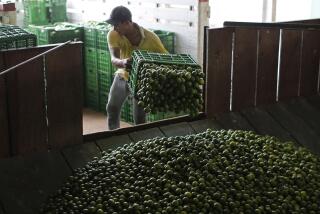Brazil troops to stay in Rio slum after backing anti-gang assault
- Share via
Reporting from Rio de Janeiro and Bogota, Colombia — After a two-pronged, weeklong assault on entrenched drug gangs in Rio de Janeiro slums, Brazilian army troops will remain in the city’s worst shantytown for at least six months to maintain order, the government announced Tuesday.
In a military-style invasion Sunday, 800 troops supported 1,800 riot police using armored cars and helicopters in a two-hour operation to pacify the Complexo do Alemao slum, a sanctuary for many of the city’s hardened traffickers. The operation left 50 dead, including three police officers. Authorities made 123 arrests. Significant caches of drugs and weapons were seized.
The Defense Ministry’s decision to keep the troops stationed in the slum came despite complaints from civic activists that the soldiers weren’t fit for a policing role and might only anger residents. Rio de Janeiro state Gov. Sergio Cabral, who made the request, argued that many of the troops have performed peacekeeping duty in Haiti.
Brazilian officials are feeling pressure to gain the upper hand on Rio’s violent drug gangs in advance of the 2014 World Cup soccer matches and the 2016 Olympic Games, which take place in Rio and other Brazilian cities. To deal with the city’s high crime rate, authorities are promising to add 60,000 police officers to the state’s forces by the time the Olympics start. Poverty and high rates of drug use have made Rio one of the continent’s most violent cities.
President Luiz Inacio Lula da Silva said he would visit Rio on Thursday, but he did not specify whether he would go to the favelas, or slums.
“Obviously, the operation isn’t finished; it’s only begun. We don’t know how many criminals escaped, how many are still inside,” Lula said on his weekly radio show. “Anyway, we took the first step.”
Violence had swept over many of Rio’s slums the previous week after state police established units in a dozen favelas, a challenge to the impunity with which many of the drug gangs had operated. The units are seen as the first step toward establishing a stronger state presence in the slums, an effort that will include more schools and health clinics.
Much of the enforcement action is directed at the city’s most powerful gang, the Red Commandos, formed in 1979 in prisons, where political prisoners taught common criminals guerrilla tactics.
Drug gang leaders, many of them in prison, ordered the wave of violence, including bus and car burnings, prompting Defense Minister Nelson Jobim’s offer to send in troops. On Thursday, police aided by soldiers and marines launched a massive operation in the Vila Cruzeiro slum. The attack was broadcast on local television and attracted high ratings.
Police officials feared that many gang members in Alemao escaped through the sewer system and were pursuing them there Tuesday. State police officials said they had seized 33 tons of marijuana, a quarter-ton of cocaine and 135 firearms in the slum.
Its population of 100,000 crammed into shacks, the Alemao slum suffers from the worst poverty, the lowest education levels and highest unemployment rate, 20%, in the city.
Former President Fernando Henrique Cardoso, who has promoted the idea of legalizing drugs, supported the police action Sunday, telling reporters that the violence of the gangs is “a reaction to the fact the government is doing something.”
State legislator Marcelo Freixo wrote in an op-ed piece Sunday saying that the drug violence is a reflection of the fact that boys and young men in the favelas have few options to crime.
“They have guns in their hands and nothing in their brains. They have no ideology,” Freixo wrote. “They don’t even expect to live. They only know barbarity.”
Soares and Kraul are special correspondents.
More to Read
Sign up for Essential California
The most important California stories and recommendations in your inbox every morning.
You may occasionally receive promotional content from the Los Angeles Times.













